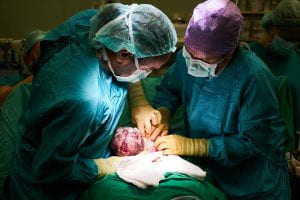A study reported to the Journal Nature, found evidence that infants born by C-sections have different microbiota than babies born vaginally. The study found that method of delivery plays a factor in which bacteroids colonizes the intestines of infants immediately after birth.
The study was conducted in the United Kingdom. Researchers took stool samples from 596 babies in total– 282 born via cesarean section and 314 born vaginally. Scientist took samples four, seven and 21 days after birth and samples a couple of months later after birth. They also took stool samples from 175 mothers took help determine the origin of the gut microbiota.
Research found that babies born through cesarean section have less “good” bacteria from their mothers and more bacteria from the environment in which they are born. The infants born by c-sections contained pathogens such as enterococcus, enterobacter and klebsiella, which have been found in hospitals. Via natural birth, infants’ intestines contained gut microbiota from their mother as well as the environment in which they were born. Later on in infancy, researchers found that babies born by c-sections showed more similar gut microorganisms as their naturally-birthed counterparts.
Scientists found that in the gut microbiota found in infants born via c-section, some pathogens contained antimicrobial resistance and bacterial virulence factors. This could potentially make infants born by cesarean sections more susceptible to infections and weaken their immune systems.
Researchers concluded that the environment in which babies are born factor into how gut microbiota will be composed from birth to infancy. But it still remains unclear if the initial difference in gut microbiota will have any health effects later on in life.
Regardless of this study, c-sections are still important to the health of millions of babies and mothers worldwide. In no way should this study discourage women from having c-sections; especially, if they are a necessity. Caesarean sections have saved millions of lives and will continue to do so.



Leave a Reply